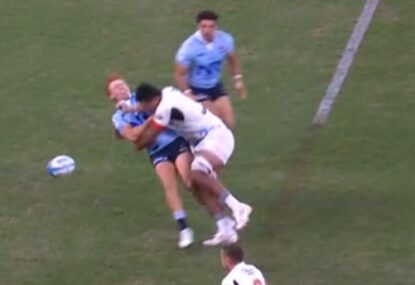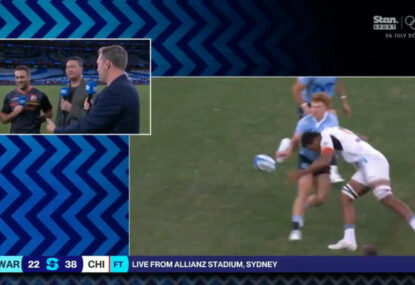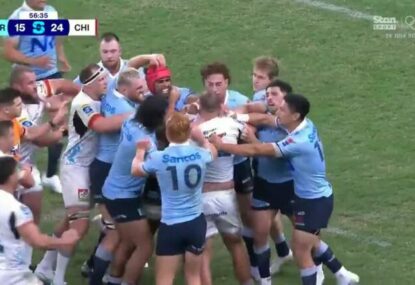You could break down the scoring sequence of Saturday’s test into fairly simple notation, and by doing so get almost a more complete a picture than any prose might describe, not needing to delve further… either by romanticising the occasion or betraying partiality, mentioning ratios of endeavour / success or the stoicism of any defensive resolve… all you would need is context.
In the context that saw New Zealand as visitors, at a fixture upon which the probable outcome of a tournament rested, and against the reigning world champions, then…
Smith try
Carter misses conversion 5-0
Carter misses penalty
Carter misses penalty
Carter misses penalty
Montgomery misses penalty
Montgomery misses penalty
Carter try
Carter lands conversion 12-0
Carter misses penalty
Carter misses drop
Carter misses drop
Mealamu try
Carter lands conversion 19-0
…tells a very simple tale, that of a comprehensive rout.
Such a rout also removes any need for itemising the poor efforts of officials involved and the tactics employed to increasingly comic lengths by the vanquished hosts, allowing us to concentrate solely on a clinical performance by the visitors to find not just how but why it happened.
The margin of the win was one thing, but its character was another. It was never about the Springboks, they were always going to play the way they did. They always do. The victory was born on the whiteboards of the All Black tacticians, its margin depending on the successful execution thereof, but the positive nature of the All Blacks’ play also created its own self-sustaining momentum and swept all other petty considerations such as niggle and incompetent officials aside.
The All Blacks’ precision made any Springbok game plans ineffective. The fight was never easy, of course, but one side effect of the All Blacks’ relentless commitment in greater numbers and closer understanding between team-mates was the creation of confusion amongst the Bokke… increasing incrementally with each forced error, and by full-time the Springboks had been utterly dissected.
Back in the days before New Zealand’s aura of invincibility was fractured (when the black brand piggy-backed rugby into a major world sport and professionalism levelled the playing field), hunting as a pack and controlling territory by maintaining defensive pressure were things the All Blacks did on autopilot.
We took it for granted. Body positions were low, all halves, five-eighths and fullbacks kicked with both feet, set piece ball was sacred, and you held onto possession rather than risking transactions in contact.
I got a lot more sleep last century.
Now in these heady times, when we seem prepared to select brutes based on their body mass index and we squander opportunities to win World Cups by playing fifteen-man hot potato, I get a little misty-eyed when I see the All Blacks return to the ways of old.
Flanker Richie McCaw’s leadership of the black forwards, always at the point of play, was one of the main building blocks. He strode the Newlands turf like a colossus, dominating the breakdown area from the opening whistle… charging, tackling, distributing and even kicking artfully for centre Conrad Smith’s opening try. I’ve never seen a captain of any side not only be the best player on the park but also successfully correct refereeing decisions. Every other piece in the All Blacks’ puzzle fell into place, as his team followed wherever he led them.
Given the clean ball he loves, Dan Carter’s capitalisation on every advantage was swift. His territorial kicking was subtle and authoritative. The tension only remained so high because his uncharacteristically wayward goalkicking kept the lead at five points, and there were times in the scoreless hour following that opening try when the All Blacks had to defend their line, but they did so convincingly whenever required and never lost their grip on the match.
Following McCaw’s lead, the other All Blacks became like a giant multi-celled organism, their functions all hard-wired responses in optimum conditions. They seemed to understand each other’s roles implicitly.
Trying to play catch-up but with few sound options, the Springboks kicked the ball not only dead twice but out on the full at least three times. With quick throws they placed themselves under further pressure, the All Blacks punishing every uncertainty. At times in desperation South Africa made a little ground and stretched the New Zealand defence somewhat, but it always held.
With the pressure on the home side increasing steadily, the All Blacks delivered a mortal blow with fifteen minutes remaining. Carter saw the defence split by successive phases wide right and wide left, then ran straight and hard at the line. Reaching out in the tackle of two Springboks, he grounded the ball one-handed behind his head.
Wild-eyed now and making poor decisions in the face of the relentless fifteen-man assault, the Springboks took yet another quick throw then hurled an injudicious pass to where Keven Mealamu was waiting, and the All Blacks’ replacement hooker strolled over to complete the scoring.
In the past, bad officiating has cost New Zealand the occasional test match victory… but probably no more than any other team. In this win, although the standard of refereeing was as low as I can remember this year, the All Blacks’ performance was such that the incompetent officials became irrelevant. The world champion Springboks were comprehensibly thrashed.
A colleague had suggested after the magnificent showing at Eden Park that if that standard became a benchmark, it soon wouldn’t matter who the opposition was. Now, with two complete performances coming in successive tests, a return to the days of the All Blacks having an aura of invincibility is a very real possibility.



































































































